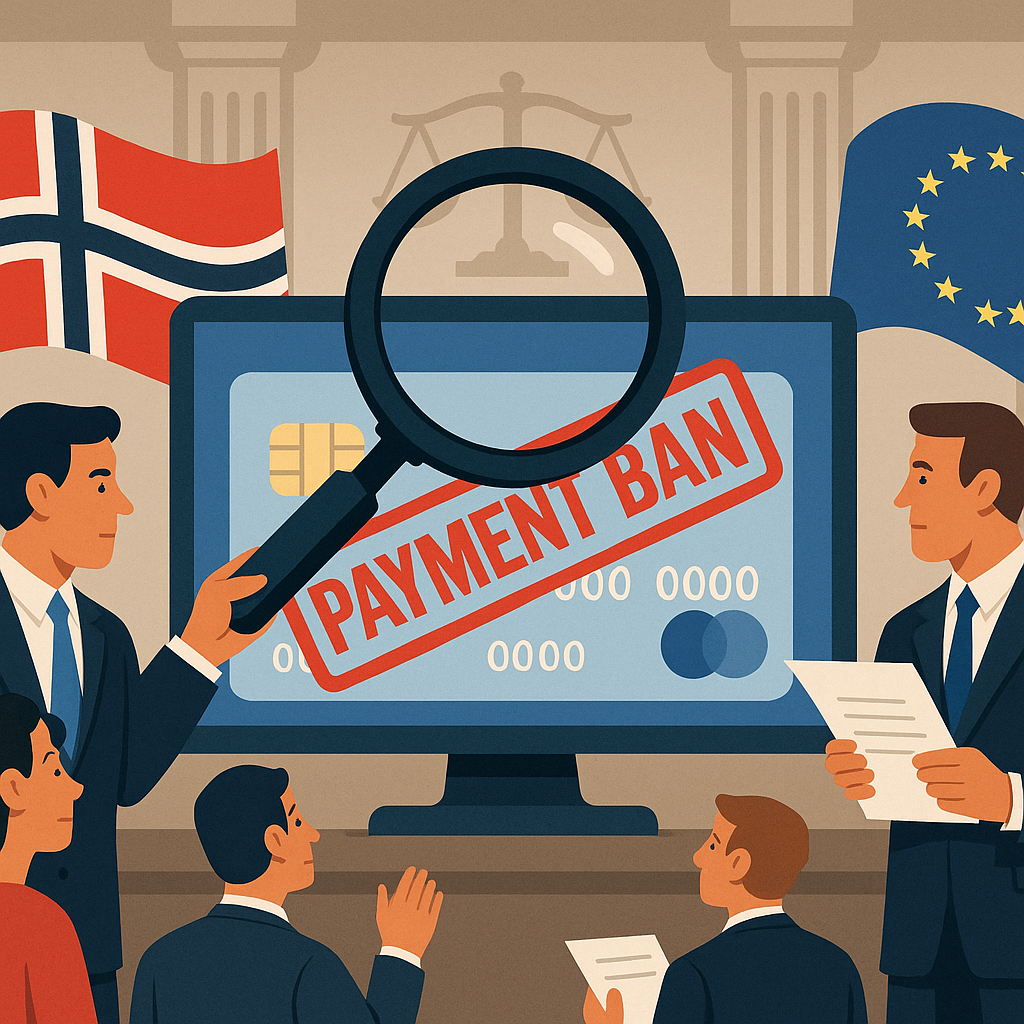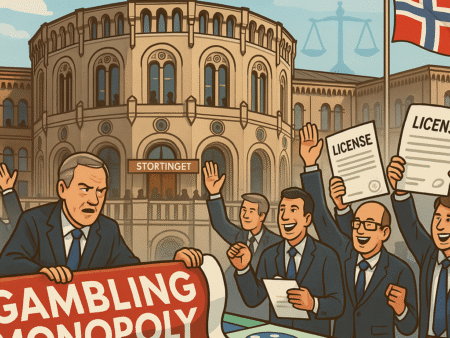
The controversial Norway payment ban on gambling transactions is facing fresh scrutiny from European authorities. The European Economic Area (EEA) has opened an inquiry into whether Norway’s restrictions on deposits and withdrawals violate rules on the free movement of services.
This marks a turning point in the long-standing debate over the Norwegian gambling monopoly, offshore competition, and the rights of European consumers.
Table of Contents
Background – Why Norway Enforced a Payment Ban
Norway introduced the Norway payment ban in 2010 as a way to protect its monopoly system. Banks and payment providers Norway were ordered to block transactions to and from unlicensed gambling companies.
The aim was twofold:
- Channel players toward Norsk Tipping and Norsk Rikstoto.
- Reduce access to online gambling Norway platforms based abroad.
While the policy initially reduced transaction flows, players quickly found alternative methods to bypass restrictions.
Why the EEA Gambling Investigation Matters
The current EEA gambling investigation questions whether the Norway payment ban is compatible with EEA law. The EEA Agreement guarantees the free movement of goods and services across member states, and critics argue that blocking cross-border payments infringes on those rights.
If Norway is found in violation, it may be forced to relax or repeal its restrictions, potentially reshaping the entire market for online gambling Norway.
How the Ban Affects Payment Providers Norway
For financial institutions and technology firms, the restrictions have created a web of challenges that are costly and difficult to manage. Banks are required to intercept transactions that fall under specific categories, often relying on merchant codes to determine which payments should be blocked. This process is not always straightforward, since many international companies operate with complex payment structures that make it hard to identify gambling-related activity with complete accuracy.
Digital wallets and fintech providers face an even more demanding task. Their business models emphasize speed, convenience, and seamless transactions, yet the rules force them to slow down transfers, run constant checks, and sometimes refuse legitimate payments in order to remain compliant. Maintaining these monitoring systems requires significant investment in technology and staff training, which places pressure on both large institutions and smaller startups trying to compete in the financial sector.
From the perspective of consumers, the outcome has been frustratingly inconsistent. Some customers find that their transactions are suddenly declined without explanation, while others discover that certain payments still slip through despite the restrictions. This lack of predictability erodes trust in the payment system itself, leaving users unsure whether their accounts will function as expected when making deposits or withdrawals.
The tension has also affected the relationship between regulators and the financial industry. Banks and payment providers have voiced concerns that they are being asked to carry too much of the enforcement burden, while regulators insist that strict oversight is necessary to uphold national policy. The result has been a strained partnership, with financial institutions caught between fulfilling their service commitments to customers and meeting the ever-increasing compliance demands placed on them by authorities.

Tension with the Norwegian Gambling Monopoly
The Norwegian gambling monopoly relies heavily on the payment ban to limit offshore competition. Without this tool, Norsk Tipping and Norsk Rikstoto would likely lose even more ground to foreign online gambling Norway operators.
The EEA’s involvement therefore strikes at the heart of Norway’s restrictive model.
Player Workarounds and Market Realities
Even with strict restrictions in place, determined players have continued to find ways around the rules. Instead of relying on traditional card payments or local bank transfers, many have turned to alternative methods that allow them to bypass national controls. Prepaid cards, for example, can be purchased anonymously and used to fund accounts without triggering the same checks that banks are required to perform. This makes them a convenient option for individuals who want to continue gambling online without drawing attention to their activity.
Another popular workaround has been the use of foreign e-wallet services. These digital accounts are often registered outside of Norway and therefore fall outside the direct reach of domestic regulators. Once set up, they can be topped up using ordinary bank transfers and then connected to gambling platforms, effectively creating a shield between the player and the restrictions imposed at home. This extra step may seem inconvenient, but for many it has become a routine part of accessing international gaming sites.
In recent years, the rise of cryptocurrencies has added yet another layer of complexity. Digital assets such as Bitcoin and Ethereum can be transferred across borders without relying on traditional banking networks, making them especially difficult for regulators to track or control. For players comfortable with new technology, cryptocurrencies provide a direct channel to offshore platforms that is almost impossible to block.
The persistence of these workarounds shows that the restrictions, while strict on paper, have not been fully effective in practice. Instead of discouraging people from seeking alternatives, the measures have simply encouraged the growth of new payment solutions designed to sidestep them. This reality underscores why the ongoing investigation at the European level is so significant. It raises questions not only about the legality of the policy under international agreements but also about its real-world effectiveness in achieving the goals it was meant to serve.
Comparing Norway to Other Nordic Countries
- Sweden: Abandoned its monopoly in 2019, no payment ban needed.
- Denmark: Operates a licensing system with regulated payment solutions.
- Finland: Still maintains a monopoly but is moving toward reform by 2026.
These examples make the Norway payment ban look increasingly isolated in the Nordic context.
Possible Outcomes of the EEA Gambling Investigation
- Ban Upheld – Norway continues its current approach, but with international criticism.
- Ban Modified – Certain restrictions remain, but with exemptions to satisfy EEA rules.
- Ban Repealed – A shift that could push Norway toward licensing, ending reliance on the Norwegian gambling monopoly.
Each outcome will directly affect payment providers Norway, offshore companies, and players engaged in online gambling Norway.
Authors Conclusion
The decision to block financial transactions connected to gambling has become one of the most heavily debated measures in Europe’s regulatory landscape. Supporters argue that it was a necessary safeguard to protect consumers and preserve the state’s control over the market, while critics describe it as an outdated attempt to fight the realities of a digital economy. Now, with European authorities taking a closer look, the measure is under more pressure than ever before. The investigation has the potential to reshape not just Norway’s approach but also how similar restrictions might be judged in other countries.
The stakes are particularly high for the state-run system that has relied on these financial controls to keep players within its own network. Without the ability to block payments, the exclusive operators would struggle to prevent customers from choosing international sites that offer different products, higher payouts, or more attractive promotions. This would not only challenge the economic foundation of the monopoly but also force policymakers to reconsider the long-term sustainability of their current model.
Financial institutions and technology companies are also caught in the middle. Banks, e-wallet providers, and fintech firms have spent years adjusting their systems to comply with the restrictions, often at considerable expense. The uncertainty created by the ongoing investigation means they must continue to invest in monitoring and compliance tools even though the rules themselves may eventually be overturned. For them, the outcome is not only a matter of policy but also of operational efficiency and trust in the regulatory environment.
Regardless of how the inquiry concludes, the process itself highlights a critical turning point for gambling regulation in Norway. It forces a broader conversation about the balance between national sovereignty and international trade obligations, about how much control a government can or should exert over consumer choice, and about the effectiveness of restrictive measures in a world where digital workarounds are always available. The resolution of this case will send ripples far beyond Norway’s borders, influencing future debates on gambling policy across Europe.











